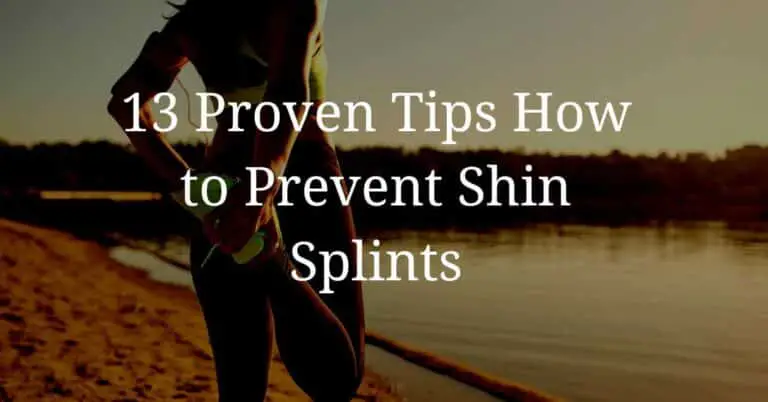Shin splints are a typical running physical issue. In fact, most athletes experience this injury at some point. The term, “shin splints”, describes soreness you feel along the front of your shinbone, or on the back of the lower leg. There’s good news! With proper rest and exercise, shin splints can be treated with success. In this article, I will share the findings of my research on how to prevent shin splints.
** I may earn a commission when you purchase through a link on this page. **
How to Prevent Shin Splints
1. Try strength training to stabilize the legs, hips, and ankles
Strength training can bolster the stability of your legs, hips, and ankles, reducing the risk of shin splints. Focus on exercises that target these areas for the best results.
2. Purchase quality footwear
Quality footwear can provide the necessary support and cushioning to your feet. Look for shoes specifically designed for your type of activity and replace them regularly to maintain optimal support.
3. Get in some good stretching
Regular stretching keeps muscles flexible and can help prevent injuries like shin splints. Include stretches that target your calves and shins in your routine.
4. Avoid running on hard surfaces
Hard surfaces can put extra stress on your shins. Whenever possible, opt for softer surfaces like grass or dirt trails.
5. Working out should include warmup or cooldown stretches
Warming up before workouts and cooling down afterward can help prevent shin splints. These practices promote better blood flow and prepare your muscles for exercise.
6. Gradually increase the intensity of your workout
Increasing your workout intensity too quickly can lead to shin splints. It’s better to gradually increase your activity levels, giving your body time to adapt.
7. Use orthotics
Orthotics can provide additional foot support and correct biomechanical imbalances. Consult with a professional to see if orthotics are a good option for you.
8. Avoid running downhill
Running downhill puts more stress on your shins. Try to vary your route or use a treadmill set at a zero incline to prevent this.
9. Cross-train
Mixing up your workouts can help prevent overuse injuries like shin splints. Consider activities like swimming or cycling that are low-impact on your shins.
10. Shorten your stride
A shorter stride can reduce the impact on your shins when running. Aim for a more natural, comfortable stride length.
11. Get a massage
Regular massages can help alleviate muscle tension and increase blood flow, which can aid in shin splint prevention. Consider seeing a professional massage therapist or using a foam roller for self-massage.
12. Make sure footwear has proper support
Shoes with good arch and heel support can reduce the risk of shin splints. Ensure your footwear fits properly and provides adequate support for your feet.
13. Have your running technique analyzed by a physical therapist
Incorrect running techniques can contribute to shin splints. A physical therapist can analyze your technique and suggest improvements to help prevent injuries.

Where do shin splints occur?
The term, “shin splints”, refers to the pain and tenderness along or just behind the large bone in the lower leg.
Shin splints develop after hard exercise, sports, or repetitive activity. They cause pain on the front or outside of the shins or on the inside of the lower leg above the ankle.
How do shin splints happen?
Shin splints occur when the muscles and bones in the lower part of the leg pull and pull at their insertion point on the shin bone and it becomes inflamed, irritated, and often quite painful.
Athletes often have shin pain because they put repeated stress on the shin bone, muscles, and associated connective tissues.
Are shin splints painful?
If you have aching legs or lower leg pain that gets worse after exercise, you probably have shin splints.
The pain can be sharp or dull, and it may come and go. While shin splints are not a serious medical condition, if the pain persists, it is suggested you visit your doctor to rule out the possibility of a stress fracture.
What is the best stretching for shin splints?
Shin splints are an injury commonly experienced by athletes or people who exercise at different levels of activity. Runners, soccer players, and even walkers all can experience shin splints from time to time.
Whether you have shooting pain or tightness around your shins, there are ways to prevent shin splints from affecting your activities.
One of the more common exercises to prevent shin splints is called the toe-drag stretch. This popular stretch will extend from the top of your foot up into your shin, releasing tension and preventing tightening.
To stretch the front muscles in your shin, begin by standing up straight and bending both knees slightly. Keep one foot on the ground while the other foot curls. The curled foot’s toes should press against the floor. Hold for this stretch for 15 to 30 seconds before switching to the other foot.
Another common stretch is the kneeling stretch. Start by kneeling on a mat with your buttocks directly over your heels. The tops of your feet should be flat on the floor. Hold this stretch for 15 to 30 seconds. While this exercise should stretch your shins, it shouldn’t place any strain on your knees.
If you spend most of your day sitting, here’s an easy way to keep your shins stretched.
While seated, drop one of your knees towards the ground and gently bend your toes towards the ground.
Pull yourself forward while the toes are still curled toward the ground.
Hold this position for 15 to 30 seconds and repeat on each side.
Finally, here’s an easy shin stretch you can use during all your warm-up activities. Walk on your heels for a few minutes before exercising. Then switch it up by walking on your toes. After doing these stretches, your shins and calves will be stretched, and flexible.
What are the best shin splints treatments?
The good news is shin splints often heal on their own. If you see a doctor, expect to get a thorough physical exam.
They may also want to watch you run to look for problems. Since the pain associated with shin splints and stress fractures are similar, your doctor may want to perform X-rays or bone scans to look for fractures.
Shin Splint Treatments
- Rest your body. Shin splints need time to heal.
- Ice your shins to alleviate pain and swelling. Do this for 20-30 minutes every 3 to 4 hours. Continue for 2 to 3 days, or until the pain is gone.
- Use insoles or orthotics for your shoes. Shoe inserts — whether custom-made or bought off the shelf — may help people with flat feet or collapsed arches.
- Take anti-inflammatory painkillers, if needed. Non-steroidal anti-inflammatory drugs, like ibuprofen or aspirin, will help reduce pain and swelling.
How to Prevent Shin Splints
Try strength training to stabilize the legs, hips, and ankles
Strength training is credited with reducing your injury risk by correcting muscle imbalances and improving muscle activation. In addition, it can increase the efficiency of your running biomechanics which leads to improved running performance.
Buy quality footwear
.Quality running shoes or proper sports-specific footwear, not only provide substantial midsole foot cushioning, but also offer essential arch support, aid in the prevention of injuries, and can lead to improved athletic performance.
Get in some good stretching
Many active people experience shin splints, a type of injury caused by overuse and stress. Implementing foot and ankle stretches in a warmup program can help improve movement, which may help prevent shin splints.
Shin splints are pain experienced along the inner front of the lower leg, where the muscles attach to the shinbone.
Avoid running on hard surfaces
In most cases, shin splints are overuse injuries caused by small tears in the lower leg muscles. Improper or worn-out shoes should be replaced with quality running shoes.
The lack of cushioning can contribute to the problem, as can over-pronation and running on hard surfaces.
Include warmup or cooldown stretches
Competitive and recreational athletes often perform warm-up and stretching activities to prepare for more strenuous exercises or athletic performances. They are used to aid in physical performance and prevent sports-related injuries.
Warm-up activities appear to reduce the incidence and likelihood of sports-related muscle injuries.
Gradually increase the intensity of your workouts
When changing the intensity or duration of physical activity, do so gradually. If you want to increase the amount of weight you’re using while strength training, increase it by no more than 10 percent each week until you reach your new goal.
This same principle applies to running, where mileage and pace should be slowly increased, and other sports as well.
Use orthotics
People who have flat feet or recurrent problems with shin splints may benefit from orthotics. Quality shoe inserts help align and stabilize your foot and ankle, reducing stress on your lower leg.
Avoid running downhill
Often when running down steep hills, runners slow themselves down by landing heavily on their heels. This braking effect puts tremendous strain on the lower legs which can lead to shin splints.

Cross-train
Change is good! Modifying your workout routine with cross-training activities, like biking and swimming, can prevent the development of shin splints. It can also aid in the treatment of shin splints as well.
Take your time and you’ll be back to your regular running routine before you know it!
Shorten your stride
Quicker, shorter strides will force you to use a whole new set of muscles. At first, you will be less efficient until your body and muscles adjust. However, over time you will be running injury-free and able to add distances you never imagined you could tackle.

Get a massage
The muscles generally associated with shin splints are deep muscles of the lower leg.
Remedial massage, myotherapy, or deep tissue massage is often recommended over foam rolling or static stretching by physical therapists to more effectively isolate and reach the deeper muscles.
Remedial massage and myotherapy help to stretch the muscle and improve the circulation of blood around the calf muscles.
Use footwear with proper support
Shin splints are common when someone is starting a new sport or training regimen as tissues respond to increased use. Wearing unsupportive shoes. Shoes that don’t offer good support and cushioning can be a cause of shin splints.
Running biomechanics and gait analysis
Your running gait consists of a stance and swing. Gait analysis is a beneficial way to analyze your running mechanics. This helps improve your running speed and endurance, as well as reduce your risk of injury, and is a great way how to prevent shin splints.
I hope you found my article on How to Prevent Shin Splints helpful. Also, be sure to check out my recent posts on Fitness Gear as well as Health & Lifestyle topics.

Claudia Faucher is a full-time fitness training expert and lifestyle blogger. She is also been a certified Les Mills BodyPump instructor for the past 5 years and a fitness instructor for over 20 years. Claudia is a personal trainer and creates fitness training programs for seniors and people of all ages. She likes to use her skills and experiences to help others on their fitness journeys.




